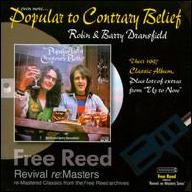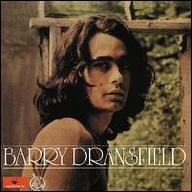Taught to play fiddle by friends who lived in the Irish community of Leeds, Dransfield performed in Yorkshire pubs before his 15th birthday. Together with his friends, he spent three years in a semi-professional New Lost City Ramblers-like bluegrass/old-timey trio, the Crimple Mountain Boys. Resigning from his harp-building job in 1969, Dransfield convinced his brother to leave a teaching career and join him in a full-time duo. Building a following with tradition-rooted performances at the Harrogate Folk Club, where they shared the stage with Martin Carthy, Ewan MacColl, and the Watersons, they continued to evolve. By 1971, they had expanded into a four-piece acoustic and electric folk band. Two years of nonstop work peaked with the release of two duo/band albums, Rout of the Blues and Lord of All I Behold, and Barry Dransfield's first solo album. The Dransfields toured with British singer/songwriter Ralph McTell and were invited to tour with Steeleye Span. They signed a recording contract with Warner Bros.
The streak of good luck ran out, however, when reports of their energetic performances were conveyed to Steeleye Span, who withdrew their invitation. Instead, the Dransfields were forced to tour the United Kingdom as opening act for American singer/songwriter Tom Paxton. Frustrations during the tour led to heated arguments between Robin Barry Dransfield, resulting in the group disbanding. Although Barry Dransfield credited the ambitious but poor-selling album The Fiddler's Dream, based on tales of a fictitious traveling fiddler and released on Transatlantic, to the band, it was primarily a solo effort. Separating for nearly a decade, Robin Barry Dransfield reunited to record an acoustic duo album, Popular to Contrary Belief, in 1977. They soon resumed their solo careers.
After releasing a solo album, Bowin' Scrapin', in 1984, Barry Dransfield announced his retirement from live performance and opened a violin and cello restoration business in Hastings, England. He returned to performing, with a vengeance, in the mid-'90s. Signaling his comeback with an impressive solo album, Be Your Own Man, in 1994, he became one of England's hardest working performers. A British tour as opening act for Steeleye Span kicked off a two-year period during which he appeared at nearly every club and festival in the United Kingdom. His fourth solo effort, Wings of the Sphinx, was released in 1996. A 39-track compilation spanning Robin Barry Dransfield's discography (together and solo), Up to Now, was released on the Free Reed label in 1997. ~ Craig Harris, Rovi














